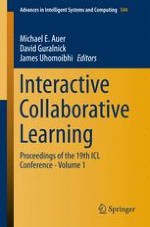2017 | OriginalPaper | Buchkapitel
Contribution Studies of Engineering Alumni on the Quality of the End of Project Studies of the Following Promotions
verfasst von : Wafa Boumaiza, Zeineb Kooli, Asma Chouki, Emna Miladi, Salah Bousbia
Erschienen in: Interactive Collaborative Learning
Aktivieren Sie unsere intelligente Suche, um passende Fachinhalte oder Patente zu finden.
Wählen Sie Textabschnitte aus um mit Künstlicher Intelligenz passenden Patente zu finden. powered by
Markieren Sie Textabschnitte, um KI-gestützt weitere passende Inhalte zu finden. powered by
